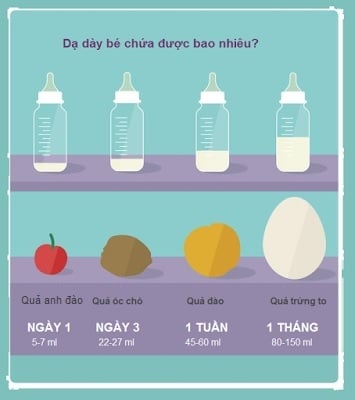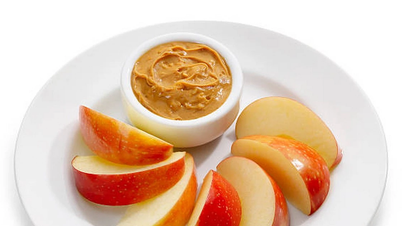When babies are born, their stomachs are shaped like cherries.
Recently, a 5-day-old infant in Quang Tri suffered a perforated stomach after being fed rice by her mother. After 23 days of surgery and treatment, the baby recovered and was discharged from the hospital.
Regarding nutrition for newborns, Dr. Bui Thi Thuy (Department of Adult Nutrition Counseling, Institute of Nutrition) shared that from birth to 6 months of age, babies only need to be exclusively breastfed, or formula-fed (as a substitute for breast milk in special cases, as prescribed by a doctor) to develop healthily.

Newborn babies have very small stomachs, only able to hold 5-7 ml of milk on their first day of life.
PHOTO: NATIONAL PEDIATRIC HOSPITAL
After 6 months, milk alone is no longer sufficient to meet the energy and micronutrient needs of the child, and this is when the child enters the stage of complementary feeding.
According to Dr. Thuy, introducing solid foods is not simply about giving children "extra" food, but rather a process of familiarizing them with solid foods, learning to chew and swallow, and forming healthy eating habits for the rest of their lives. This stage plays a crucial foundational role in physical growth, brain development, and the formation of eating behaviors.
Principles of introducing solid foods
According to Doctor Thuy, complementary feeding should begin when the child is 6 months old (or as directed by a doctor). The general principle when introducing complementary foods is to start with thin consistency and gradually increase to thicker, softer textures and coarser textures, and gradually increase the amount. It is important to respect the child's reactions and not force them to eat if they don't want to.
Do not add sugar or artificial flavorings to the food of children under 1 year old. Use natural ingredients to create a pleasant taste instead of adding salt to children's food, especially those under 1 year old.
At the same time, monitor weight and growth regularly to adjust portion sizes. Let children eat with the family to encourage them to learn and emulate eating habits.
"The most important thing when introducing solid foods to babies is to ensure three fundamental nutritional principles: a diverse diet including the four main groups: carbohydrates, protein, fruits and vegetables, and fats; a balanced energy intake sufficient for developmental needs, avoiding too little or too much; and food safety and hygiene, minimizing the risk of infection, especially for children under 1 year old," Dr. Thuy noted.
A newborn baby's stomach is very small. At birth, it's only about the size of a cherry, capable of holding 5-7 ml of milk (1-1.4 teaspoons).
By the end of the first week, a baby's stomach can hold about 60 ml of milk. Initially, the mother's body only produces a small amount of milk, suitable for the "tiny" size of a newborn's stomach.
( National Children's Hospital )
Source: https://thanhnien.vn/be-5-ngay-tuoi-thung-da-day-vi-an-com-luu-y-dinh-duong-cho-tre-so-sinh-185251028214151694.htm




![[Photo] Two flights successfully landed and took off at Long Thanh Airport.](/_next/image?url=https%3A%2F%2Fvphoto.vietnam.vn%2Fthumb%2F1200x675%2Fvietnam%2Fresource%2FIMAGE%2F2025%2F12%2F15%2F1765808718882_ndo_br_img-8897-resize-5807-jpg.webp&w=3840&q=75)





































































































Comment (0)